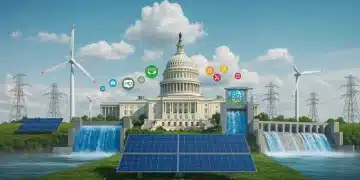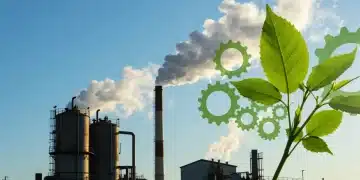But energy policy discussion: why it matters now

Future trends in energy policy focus on increased adoption of renewable energy, enhanced energy efficiency measures, and advancements in technology to combat climate change and support sustainable practices.
But energy policy discussion is more relevant today than ever. With climate change and energy demands rising, understanding these policies can help us navigate future challenges.
The current state of energy policy
The current state of energy policy is marked by a dynamic interplay between economic needs, environmental concerns, and technological advancements. Policymakers are increasingly focusing on strategies that promote sustainability and address climate change. Understanding these policies can help everyday citizens navigate their implications.
Key Drivers of Energy Policy
Several factors are shaping energy policy today:
- Climate change: As global temperatures rise, there’s an urgent need for policies that reduce greenhouse gas emissions.
- Technological innovations: Advances in renewable energy technologies make cleaner options more accessible and economically viable.
- Energy security: Ensuring a reliable energy supply is critical for national security and economic stability.
Additionally, public opinion plays a significant role. More people are recognizing the importance of transitioning to cleaner energy sources. This societal shift adds pressure on governments to enact progressive policies.
Current Challenges in the Energy Sector
Despite progress, challenges remain. Policymakers face the dilemma of balancing economic growth with environmental stewardship. As they set regulations, the need to support local economies is essential. Here are a few of the major challenges:
- Infrastructure investment: Upgrading outdated energy infrastructure requires substantial investment and long-term planning.
- Policy coherence: Different energy policies may conflict, complicating implementation and enforcement.
- Market volatility: Fluctuating energy prices can disrupt efforts toward sustainable investments.
As we delve deeper into these challenges, it’s evident that effective communication and collaboration in energy policy are vital. Engaging stakeholders—from government entities to private businesses—ensures a multi-faceted approach to energy production and consumption.
The current state of energy policy reflects the growing awareness of its impact on our lives. From legislative measures to community initiatives, every effort counts toward a more sustainable future.
Key debates in energy policy today
The key debates in energy policy today are complex and reflect a variety of opinions on how to address energy needs while ensuring sustainability. These discussions often revolve around balancing economic growth with environmental responsibilities. As energy consumption rises, the need for clear policies that respond to changing conditions becomes imperative.
Major Themes in Current Debates
Several crucial themes frequently emerge in energy policy discussions:
- Renewable Energy vs. Fossil Fuels: The transition to renewable energy is debated heavily, with discussions on its feasibility and economic implications.
- Climate Change Action: Policymakers face pressure to adopt aggressive measures to combat climate change, which can create conflicts with traditional energy interests.
- Energy Independence: Many argue for policies that promote domestic energy production to reduce reliance on foreign sources.
These themes reflect a broader societal push towards sustainable energy practices, influenced by public demand for cleaner options. Moreover, the role of technology in shaping energy policy cannot be ignored. Advances in energy storage and grid management are significant factors in crafting effective policies.
The Role of Public Opinion
Public opinion is a powerful driver in shaping energy policy. Surveys show that many citizens prioritize sustainable energy solutions and support government action to promote them. Movements advocating for environmental issues are putting additional pressure on lawmakers, affecting how policies are crafted and implemented.
This societal engagement fosters discussions on how we can adapt energy policies to reflect public will. As communities voice their preferences, it becomes essential for policymakers to respond effectively. This participation ensures a more democratic approach to energy challenges.
The key debates in energy policy today demonstrate the constant evolution of ideas and approaches in the energy sector. By considering various perspectives, stakeholders can work toward more comprehensive and effective energy solutions.
How energy policies affect consumer choices

Energy policies play a significant role in shaping consumer choices. They influence everything from energy prices to the availability of sustainable options. Understanding these policies helps consumers make informed decisions about their energy consumption.
Influence of Pricing and Subsidies
One major way that energy policies affect consumers is through pricing structures. When governments implement subsidies for renewable energy, it can make these options more affordable for households. Similarly, policies that raise taxes on fossil fuels can encourage consumers to opt for cleaner energy sources.
- Lower costs for renewable energy: Policies that support solar and wind power can lead to decreased prices for consumers.
- Taxes and incentives: Implementing taxes on carbon emissions can steer consumers toward using less harmful energy sources.
- Energy efficiency programs: Incentives for energy-efficient appliances encourage consumers to reduce their energy use.
Moreover, energy policies can drive the development of new technologies. When encouraged by government action, innovations in energy efficiency or storage can change how consumers interact with energy resources. This results in better choices that align with personal or community values.
The Role of Information and Awareness
As policies evolve, the information provided to consumers plays a crucial role in decision-making. Awareness of available options can greatly impact how consumers decide to use energy. Programs that educate the public on energy conservation and the benefits of renewable sources can shift consumer behavior significantly.
For instance, campaigns promoting the benefits of solar energy have led to increased installations in many communities. When consumers are aware of both the financial and environmental benefits of renewable energy, they are more likely to choose it. This knowledge empowers consumers, allowing them to make better choices for themselves and the planet.
In summary, the interaction between energy policies and consumer choices is complex yet vital. By understanding how policies shape the market, consumers can better navigate their energy options.
The role of renewable energy in policy making
The role of renewable energy in policy making is increasingly vital in today’s energy landscape. As the world faces the pressing challenge of climate change, governments are recognizing the need to include renewable sources in their energy strategies. This shift is essential not only for environmental sustainability but also for securing long-term energy independence.
Integration of Renewables into Energy Strategies
Many nations are incorporating renewable energy into their policy frameworks. This integration can take many forms:
- Investment incentives: Governments often provide tax breaks or subsidies to promote solar, wind, and other renewable energy projects.
- Regulatory frameworks: New regulations encourage the use of renewable sources by setting emissions targets or requiring a certain percentage of energy to come from renewables.
- Research and development support: Funding for innovation in renewable technologies can lead to more efficient systems and lower costs.
Such policies not only promote the use of clean energy but also stimulate job creation in the renewable sector, contributing to economic growth and sustainability.
Challenges in Policy Implementation
Despite the progress, integrating renewable energy into policies faces several challenges. For instance, existing infrastructure may not support these new technologies. Upgrading or replacing old systems requires significant investment.
Additionally, opposition from fossil fuel industries can hinder the adoption of renewable policies. Lobbying efforts can complicate the passage of supportive legislation. This opposition makes clear communication about the benefits of renewables and the urgency for transition even more critical.
Governments need to engage the public and stakeholders to create a solid foundation for renewable energy policies. By educating communities about the benefits of clean energy, policymakers can foster support and commitment to these initiatives.
The role of renewable energy in policy making will undoubtedly continue to evolve as technology advances and climate challenges grow. Understanding this role is essential for consumers, businesses, and governments as we navigate the path to a more sustainable future.
Future trends in energy policy
Future trends in energy policy are shaped by growing concerns over climate change and the need for energy independence. As the world shifts towards more sustainable practices, policies are evolving to reflect these priorities. Understanding these trends can help consumers and businesses prepare for the new energy landscape.
Increased Focus on Renewable Energy
Policymakers are increasingly prioritizing renewable energy sources, such as solar and wind. These sources are becoming more affordable and efficient, which makes them attractive options for governments. Many countries are setting ambitious goals to transition to green energy, which includes:
- Expansion of renewables: Investments in solar and wind farms are expected to rise significantly.
- Improved technology: Innovations in energy storage and grid management will support the wider use of renewable sources.
- Stronger regulations: New laws and incentives aim to encourage the adoption of clean energy.
This trend signals a clear shift from fossil fuels, as nations seek to reduce greenhouse gas emissions and promote a sustainable future.
Emphasis on Energy Efficiency
Another key trend is an emphasis on energy efficiency. As energy costs rise, both consumers and businesses look for ways to minimize their energy use. Future policies will likely focus on:
- Energy-efficient appliances: Incentives for energy-efficient home and office products are expected to grow.
- Building retrofits: Programs that encourage energy-efficient upgrades in buildings are becoming more common.
- Sustainable transportation: Policies promoting electric vehicles and public transport will further support energy efficiency.
By targeting efficiency, policies can help lower energy bills while also contributing to environmental goals. This approach is seen as a win-win for consumers and the planet.
Furthermore, as public awareness of climate issues increases, there will likely be a stronger demand for transparency in energy production. Consumers will want to know how their energy is generated and the associated environmental impacts. This push for accountability may lead to more renewable energy being integrated into the grid, providing cleaner options for everyone.
The future of energy policy looks bright as it adapts to changing needs and technologies. By embracing innovation and prioritizing sustainability, policymakers can pave the way for a cleaner and more efficient energy landscape.
In conclusion, the energy landscape is rapidly changing due to evolving policies that prioritize sustainability and innovation. As renewable energy sources become more integrated into our systems, both consumers and policymakers must adapt to these transformations. Understanding the trends in energy policy, from the emphasis on renewables to the push for efficiency, will help everyone make informed choices. Collectively, these efforts can pave the way for a cleaner, more efficient, and more sustainable future.
FAQ – Frequently Asked Questions about Energy Policy Trends
What are the main goals of current energy policies?
The main goals are to promote renewable energy adoption, improve energy efficiency, and reduce greenhouse gas emissions.
How do energy policies affect consumer choices?
Energy policies can influence the cost and availability of energy options, encouraging consumers to choose renewable and efficient sources.
What role does public awareness play in energy policy?
Public awareness is crucial in driving demand for renewable energy and supporting policies that promote sustainability.
What future technologies are expected in the energy sector?
Future technologies include advanced energy storage systems, smart grids, and innovations in renewable energy production.





